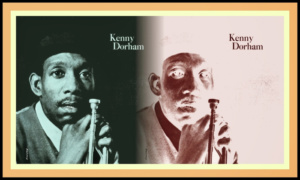Stories on Stage | “Blues Bossa” by Kenny Dorham
 Tune in weekday mornings for Stories of Standards to hear our favorite versions of “Blue Bossa.” Rodney Franks presents Stories of Standards Monday through Friday at 7:50 and 8:50am starting Monday, August 26!
Tune in weekday mornings for Stories of Standards to hear our favorite versions of “Blue Bossa.” Rodney Franks presents Stories of Standards Monday through Friday at 7:50 and 8:50am starting Monday, August 26!
Stories of Standards is sponsored by ListenUp – If you love music, you’ll love ListenUp.
“Blue Bossa” by Kenny Dorham blends hard bop with bossa nova and was probably influenced by his trip to the Rio de Janerio Jazz Festival in 1961. After the 1959 Cuban Revolution, the US State Department was concerned lest economically stressed South American countries would align with Cuba, rather than the United States. In an effort to improve relations, the State Department set up a tour in 1961 which included guitarist Charlie Byrd (substituting for Dave Brubeck, who wasn’t available), accompanied by bassist Keter Betts and percussionist Buddy Deppenschmidt. Also on the performance tour were Kenny Dorham, Curtis Fuller, Zoot Sims, Al Cohn, Herbie Mann, Ahmed Abdul-Malik, Ronnie Ball, Ben Tucker, Dave Bailey, Ray Mantilla and others. In 1962, a second tour, this one lasting six months, toured 23 countries in South America. Paul Winter and Herbie Mann were on this tour and recorded bossa nova albums in Rio de Janeiro that year.
McKinley Howard “Kenny” Dorham (30 August 1924-5 Dec 1972) was one of the most highly esteemed trumpet players of his lifetime, as can be seen by this listing from Matt Leskovic of jazz.com: Dorham replaced Fats Navarro in Billy Eckstine’s band in 1946, Miles Davis in Charlie Parker’s quintet in 1949, and Clifford Brown in Art Blakey and Horace Silver’s Jazz Messengers in 1954 and again in the Max Roach group in 1956. Dorham was outstanding on the 1954 album “Horace Silver and the Jazz Messengers” and replaced Clifford Brown in the Max Roach Quintet from 1956 to 1958. Dorham’s musical education began with piano and went to trumpet in high school. From 1963 to 1964 he recorded six albums on Blue Note with Joe Henderson. In 1971 he told Art Taylor of “Down Beat” that he intended a greater concentration of his energy on education rather than performance. He died of kidney disease in late 1972. Art Blakey had described him as the uncrowned king of modern jazz.
Become a Member
Join the growing family of people who believe that music is essential to our community. Your donation supports the work we do, the programs you count on, and the events you enjoy.
Download the App
Download KUVO's FREE app today! The KUVO Public Radio App allows you to take KUVO's music and news with you anywhere, anytime!